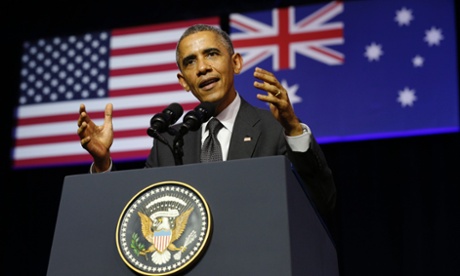Brisbane, Nov 15: President Barack Obama challenged Asia Pacific nations to choose between "conflict or cooperation," singling out North Korea's rogue nuclear program and China's tense territorial disputes with its neighbours as matters that could threaten progress in the fast-growing region.
"The question we face is which of these futures will define the Asia Pacific in the century to come," Obama said during remarks at a university in Brisbane, Australia, where he arrived today for the Group of 20 economic summit.

Australia is Obama's final stop on a weeklong trip that included visits to China and Myanmar. He arrived here determined to show leaders that his weakened political standing in the US would not affect his efforts to deepen American engagement in the Asia Pacific, which he sees as a core part of his foreign policy legacy.
In a tacit acknowledgement of the questions in the region about his commitment to that effort, the president declared that "American leadership in the Asia Pacific will always be a fundamental focus of my foreign policy."
He noted that America's commitment to the region was cemented by the generations of Americans who have fought and died in wars to ensure that "the people of the Asia Pacific might live free."
Much of Obama's Asia-Pacific policy has centred on boosting US economic ties with the region, including through a massive free-trade agreement that would include 11 other nations.
But security issues have increasingly become a focus for the US, particularly as Beijing has stepped up its aggression in conflicts with Japan, South Korea and other nations over territory in the South and East China Seas.
Obama said today that those disputes "threaten to spiral into confrontation."
"Any effective security order for Asia must be based not on spheres of influence, or coercion or intimidation where big nations bully the small but on alliances for mutual security, international law and norms that are upheld, and the peaceful resolution of disputes," Obama said.
Obama raised US concerns about the disputes in meetings earlier this week with Chinese President Xi Jinping. The territorial tensions were also expected to come up in a meeting Sunday among Obama, Japanese Prime Minister Shinzo Abe and Australian Prime Minister Tony Abbott.
China has long been wary of the trilateral relationship between the US, Australia and Japan, which it sees as an attempt to counter its growing influence.
Elsewhere in the Asia Pacific, North Korea's nuclear provocations have continued to be a vexing problem for Obama.





Comments
Add new comment